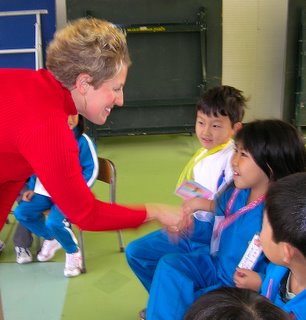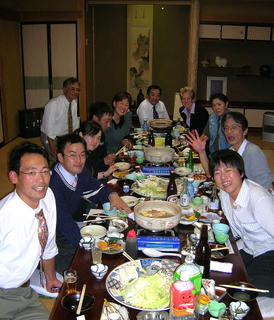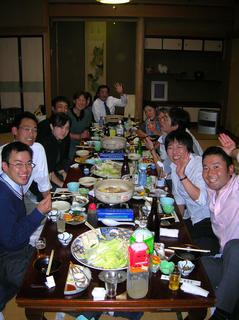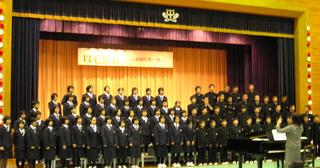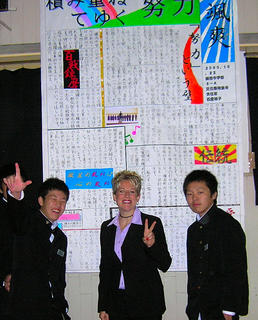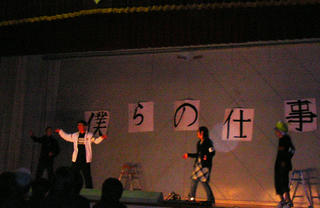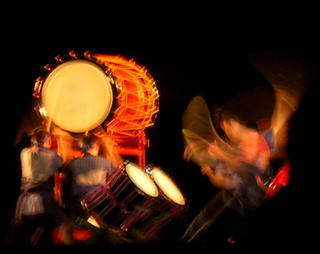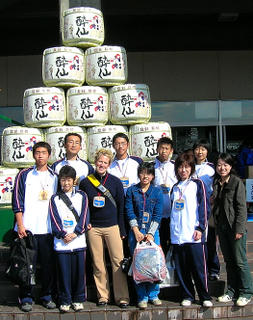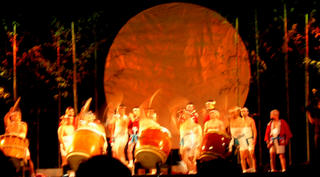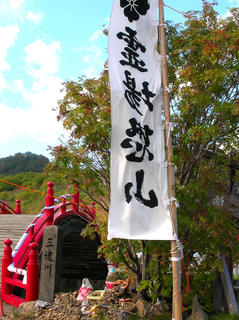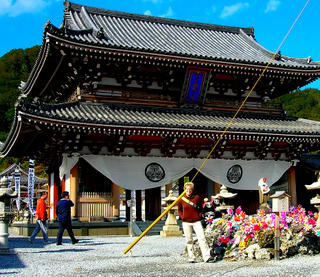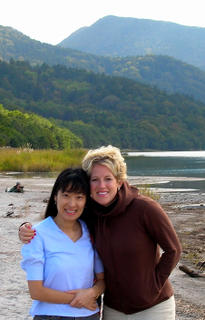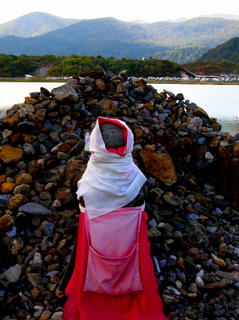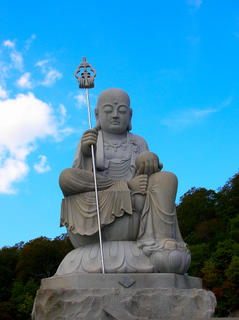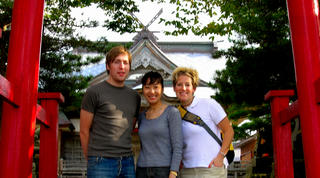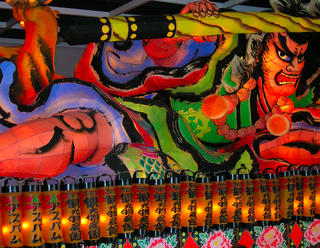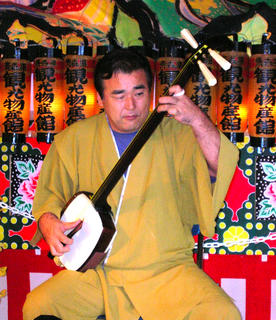 One of my MN JET pals down in Osaka just sent this pic to me. This is me taken during my tenth minute of being in Japan--which happens to be exactly 3 months ago TODAY!
One of my MN JET pals down in Osaka just sent this pic to me. This is me taken during my tenth minute of being in Japan--which happens to be exactly 3 months ago TODAY! That day feels like eeons ago, I have never experienced time flashing before my eyes like this before! I would LIKE to think maybe the next 3 months will be more relaxed, BUT with upcoming week-long trips to Tokyo, Hanamaki and Lake Towada in Akita...not to mention the big one month trip to China, Thailand, Koh Samui, Hong Kong and Taiwan...........uh, maybe things will settle down in February!??! Despite its craziness, I am so lucky to be here and still loving everything that comes my way- challenges and all.
I do have one apology however; I never write about my job. I really do serve a purpose here other than jetsetting throughout Asia. Today, I jotted down a few things about school and (concerns and questions) and the ways in which it compares to Japanese society and culture...
1. School life mirrors that of the working-world in Japan. It is a total preparation for contributing to society, participating in the community and being a respectful citizen. Now, in the States--I think our schools are 'set up' w/ those same goals and principles, BUT does it happen....NO! Why is that!? Well, lets look a bit @ why Japanese students act the way they do....
2. In kindergarten, age 4, students are given freedom, responsiliity and trust. They begin serving the school lunch, help clean the building and have homework--@ age 4!!! By the time they get to junior high, uh...they know the drill. In fact, presently, my almost all of the students are in their classrooms practicing for the upcoming School Culture Festival on Saturday (with out any teachers in the room!) Can you imagine leaving 38 9th graders unattended for ONE HOUR! Can you imagine all 38 students actually participating in the preparations for the festivities with NO direction or supervision from you!? I just sit back in awe... Moreover, students know their roles, their strengths, their interests, their niche. They hone in on anything they are interested in and practice it diligently until they have reached near perfection.
This sense of 'self' is so important in Japanese culture--as it ensures that no one will make too many waves or upset the ship. Things are so even keel here-its spooky! These attitudes carry on into adulthood, as the community members know their place. It's super hierarchal, yet no one complains about it. There is intense competition for positions and leadership roles, but everyone is respectful and supportive of one another.
I want to make a list of why these students are amazing....ALL 250 students I have. They each have their own quirky personalities, and some of them try to stand apart from the crowd a bit more than others...but it would NOT be a gross generalization to say that ALL of these students, in Taneichi,
exhibit AND/OR possess:
1. An inner desire to be the best. To persevere and never give up. To begin and finish each task --not only timely, but perfectly. There is much pressure to not only to finish first, but to do so with no mistakes. The students are tough, mentally-physically-emotionally, they never stop aspiring to better themselves. All day, every day (sometimes 10 HOUR DAYS) they give 100%. It is so interesting to see this carried out in the adult community as well. The busy-wanna-be-the-best-try-my-hardest attitude is SO apparent in all of my Japanese friends as well. Its just ingrained, or maybe genetic---I don't know?! But it is amazing to be surrounded by-and contagious!!! I never stop going, doing, moving, trying...I actually feel pressure to "kick it up a notch" too!
2. Many A+ students struggle in English class...understandable, our language is so difficult. When a student struggles during class, not only do their classmates rush to teach them, but they will also patiently wait for the student to figure it out. My teacher-pals out there know that when the material gets difficult, the behavior gets out of control and discipline becomes the entire focus of class. I can't describe why there are NO discipline problems here...perhaps because they are only reinforcing positive behavior? I had never seen 38 kids in a classroom...standard six-deep, straight rows...attentive and interested in perhaps the LEAST pertinent subject during their day. Isn't ADHD a world-wide phenomenon?! Why is it that NOT one of my 250 students exhibits ADHD tendencies? Really makes you think twice about "what" we are medicating...maybe the best medicine is tough love, consistency and stability?
3. These students take initiative. We all know people who are "askers", these kids are "doers." I don't need to say, "Don't forget your homework?" or "Why didn't you finish your assignment?" Such things are their "duty"--as they say here. School is a job--its preparation for their future and what they do in junior high WILL determine WHERE they go to high school---which WILL determine WHERE they go to University--which ultimately, is indicative of how successful they will be someday. [This tracking process happens in all countries, but I'm not sure everyone takes it as seriously as the students do here.] Their drive to succeed, passion to learn AND ability to withstand intense peer pressure in this ultra-competitive culture packs a powerful punch and definitely paves the way for a bright future full of many strong Japanese leaders!
4. As stated before, the schools are preparing for their bunkasai. It is a culture festival-that is designed to showcase the students multiple abilties--musically, academically and socially. The festival is COMPLETLY designed, prepared, organized and carried out by the students (not a shocker!) They have been working on finalizing things for over 3 weeks now. It is a VERY big deal as the parents and community come to the school to learn about the students. It is an opportunity for the students to show off their multivarious talents and to practice working as a team. One team building exercise is the singing portion of the festival---each class within each grade must sing 2 songs. They choose the songs and teach eachother the different parts and perform it. They help someone learn the piano part, they choose a conductor and have several "mini leaders" for each section that actually hold practice! Keep in mind, these schools do not have "CHOIR"---so they have no real formal training in music. BUT they sound like angels. I kid you not, listening to them (and knowing how many hours they have put into teaching one another) makes it all so beautiful, that I find myself a bit choked up at times. The teachers say that one of their goals of the bunkasai is to prepare students to work in the community---using teamwork and communication to be successful!
5. Lastly, before I close this 10 page posting, I want to mention that the teachers in Japan have it made. I KNOW they work very hard to prepare lessons and make sure all objectives are being taught...BUT these kids really do MOST of the work here. They are self-disciplined, self-motivated and have incredible self-esteems! They don't need you to play mother, best friend, pyschologist, guidance counselor etc. They need you to collect and correct, to continue assigning worksheet after worksheet (ah, the repetition kills me, but not them!) The teachers have no IEPs, no medications, no hassles...and conferences only once a year! So why am I contemplating returning after one year of this bliss!?! Well, that would take another 15 pages to explain so I'm going to suffice it to say, its one hell of an experience over here. I am just dumbfounded by the many differences in curriculum, pedagogical practices, student performance and expectations. I'm here to be a sponge, and as is indicated by this lengthy message---I am doing just that!
Big hellos to all of my teacher pals back home! I LOVE receiving your emails about your classrooms...please send them this way or BETTER yet drop a line through the 'post a comment' link below! Let me (and others know) why teaching is WONDERFUL and why teaching can be so CHALLENGING!
 So the day was spent doing basic vocabulary and some self-introduction phrases (ex. colors, animals, body parts, "how are you?" and "what's your name?" etc) I really felt motivated today to give these students my best effort---For two reasons: one, in seeing how fearful my junior high students are of english, i wanted to disspell some of the scariness. And two, I learned that it was the only day scheduled for this school year for an English teacher to stop by! How disappointing....one step forward and 3 steps back. No wonder their first year of English in junior high is all basic vocab and phrases.
So the day was spent doing basic vocabulary and some self-introduction phrases (ex. colors, animals, body parts, "how are you?" and "what's your name?" etc) I really felt motivated today to give these students my best effort---For two reasons: one, in seeing how fearful my junior high students are of english, i wanted to disspell some of the scariness. And two, I learned that it was the only day scheduled for this school year for an English teacher to stop by! How disappointing....one step forward and 3 steps back. No wonder their first year of English in junior high is all basic vocab and phrases. Japan is considering making English instruction mandatory at the elementary level. It's a hot debate right now and I can probably argue for it either way...........BUT I really can see the benefits of starting while they are young--if you are going to require it of them in high school. Damian and I were chatting last nite about this very topic, and while I don't completely agree with him in that English instruction should be optional in high school, I DO think that the students should be required to study A LANGUAGE---korean, chinese OR english---of their choice. I'm quickly learning that to acquire a language you need several things:
Japan is considering making English instruction mandatory at the elementary level. It's a hot debate right now and I can probably argue for it either way...........BUT I really can see the benefits of starting while they are young--if you are going to require it of them in high school. Damian and I were chatting last nite about this very topic, and while I don't completely agree with him in that English instruction should be optional in high school, I DO think that the students should be required to study A LANGUAGE---korean, chinese OR english---of their choice. I'm quickly learning that to acquire a language you need several things: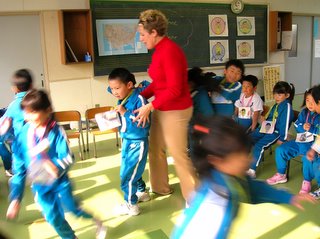 Again, I wish to extend sincere thanks to the staff at this school. So welcoming and willing to TRY to communicate with me. There school is "English friendly" and that makes me feel good about the likelihood of their students' successes in English! This morning they had a welcoming ceremony for me, where I sat in front of the entire school --like I was on a panel. Various students read off some scripted speeches and all of the students/teachers stood at attention, while singing a song! It was so precious! Moments---I mean, DAYS---like these are days I will never forget.
Again, I wish to extend sincere thanks to the staff at this school. So welcoming and willing to TRY to communicate with me. There school is "English friendly" and that makes me feel good about the likelihood of their students' successes in English! This morning they had a welcoming ceremony for me, where I sat in front of the entire school --like I was on a panel. Various students read off some scripted speeches and all of the students/teachers stood at attention, while singing a song! It was so precious! Moments---I mean, DAYS---like these are days I will never forget. 